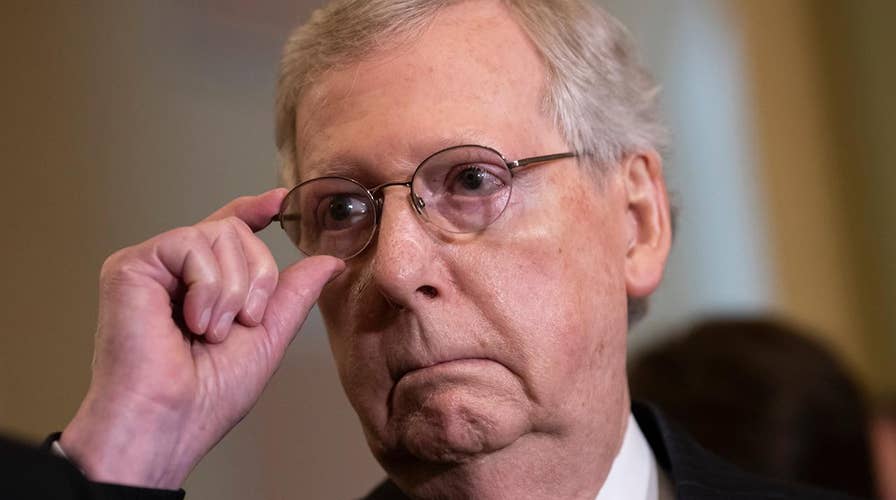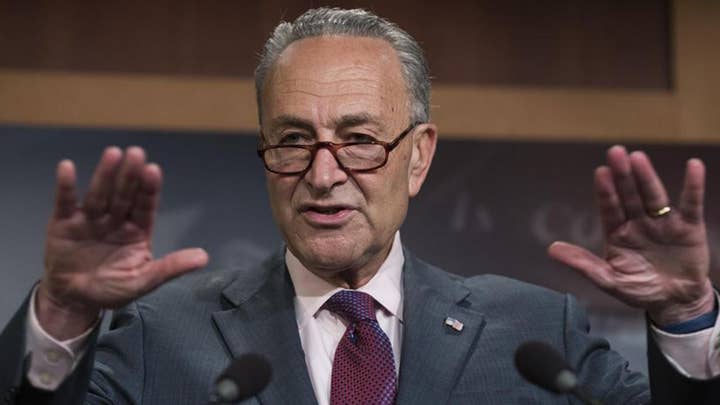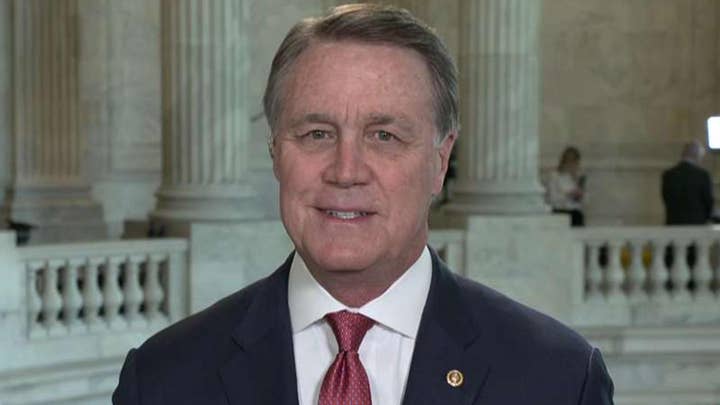Senator McConnell cancels most of Senate's August recess
GOP Senators Ted Cruz and Lamar Alexander join 'The Daily Briefing' with details on the poll they're conducting to help determine Republican legislative agenda for the remainder of 2018.
Summer recess is off.
Congress will toil amid the boiling heat of the nation’s capital in August, conducting the taxpayer’s business.
The only parts of those sentences which are 100 percent correct pertain to summertime atmospherics in the District of Columbia.
This is why Republicans appear to have already won the optics war when it comes to “canceling the August recess.”
All lawmakers must declare is “We’re in session working and not in recess in the summertime or around Christmas” and the public generally laps it up.
It was only the Senate which canceled the August recess. And the Senate only eliminated part of the recess. It’s far from clear what the Senate may accomplish. And, not everyone in Washington is even convinced the Senate will linger in session in August much at all.
Most voters don’t check the Senate’s webpage to see what cloture petitions are ripening and which nominations are in the queue for Senate business on a given day. They don’t watch gavel-to-gavel coverage of the Senate on C-SPAN2. Many can’t even tell you the names of both of their senators.
But the the public hears that Congress is working. And that’s all that matters. Senate Republicans may have already won the optics war when it comes to “cancelling recess.”
To be clear, it was Senate Majority Leader Mitch McConnell, R-Ky., who decided that the Senate - not the House – would forgo four of the five weeks designated for the hallowed “August recess.”
“Due to the historic obstruction by Senate Democrats of the president’s nominees, and the goal of passing appropriations bills prior to the end of the fiscal year, the August recess has been canceled. Senators should expect to remain in session in August to pass legislation, including appropriations bills, and to make additional progress on the president’s nominees,” said McConnell.
“I’m damn glad,” opined Sen. John Kennedy, R-La., about the schedule change. “Louisianans understand that good things come to those who work their ass off. I’m ready to work nights. Weekends. All of August. Christmas. Whatever it takes.”
But some are unsure whether the “August recess” gambit is really about getting work done or not. Democrats note that of the 33 Senate seats up this year, 24 fall on their side of the aisle. Meantime Republicans must only defend nine seats.
Many of the Democratic seats are in battleground or GOP-leaning states like Indiana, West Virginia and Montana. Most of the Republican seats are in solid conservative states. So, leashing vulnerable Democrats to Washington to prevent them from campaigning may not be a bad strategy if you want to boost a narrow 51-49 GOP seat advantage in the Senate…if that’s in fact the tactic.
Senate Majority Whip John Cornyn, R-Texas, suggested none of this matters. The politics. The perception. He says there’s actual work to do.
“Other than perhaps us here inside the Beltway, folks back home really couldn’t give a flip,” said Cornyn.
Senate Minority Leader Chuck Schumer, D-NY, embraced the new schedule. He said Democrats would use the time to wrestle with health care and rising premiums.
“We welcome the opportunity to address it and we’re going to work very hard in August to require our Republican colleagues to do something about it,” said Schumer.
Such a path could be fraught with peril. First of all, Democrats don’t control the Senate floor. Secondly, health care polls highly as an issue important to voters. Democrats may want to fix some of the problems. But it’s risky for Democrats to overplay their hand on this. After all, it was Democrats who passed Obamacare – the root of many problems in the current health care system. Forcing a debate about health care just before the midterm elections could rekindle negative views voters still harbor about the Affordable Care Act.
That could spark a backlash against Democratic senators who voted for the law like vulnerable Democrats like Sens. Jon Tester, D-Mont., Bill Nelson, D-Fla., Claire McCaskill, D-Mo., Sherrod Brown, D-Ohio, who voted for the health care law. Moreover, a debate on health care could help boost a last-ditch effort by Sens. Lindsey Graham, R-S.C., and Bill Cassidy, R-La., to fully repeal and replace Obamacare. Graham and Cassidy tried their health care maneuver last September. The rejuvenation of the health care debate could prompt a similar scenario this year just before the midterms if Democrats overplay their hand.
It was President Trump who demanded the Senate labor in Washington this August. And so Schumer turned the tables on the President.
“Now that the Majority Leader has acceded to President Trump’s demands on the August schedule, We want the President to be here in Washington working with us as well because he has caused a lot of these problems, said Schumer. “We presume he won’t be jetting off to Bedminster or Mar-a-Lago or spending countless hours on the golf course.”
Whether Mr. Trump acquiesces to Schumer’s request is unclear. But Democrats created an interesting political wedge to deploy against the President and Republicans. And despite all of the breathlessness about August, many aren’t sure how much the Senate will truly be here.
Last year, McConnell announced in mid-July the Senate would remain in session for half of the August recess. They wound up working three and a half days and then bolted for the month after senators reached a deal to confirm a slate of 77 nominees.
McConnell made the announcement about August this year in early June. The decision was a GOP shot across the bow of Democrats: back off their requirement that the Senate burn inordinate hours each week on routine nominations. Relent and perhaps you won’t have to hang out in Washington come August.
Schumer argues Democrats aren’t making life difficult for GOP nominees.
“Mitch McConnell can’t have it both ways. He spends all of his time bragging to his base that they’ve confirmed more judges than anyone else and now he’s saying they haven’t confirmed enough,” said Schumer.
Still, McConnell’s announcement in June about the August threat gives leaders nearly two months to reach a pact on nominations. Or, they may even forge an arrangement where the Senate appears it’s in session a lot in August - and it is. But the Senate only convenes with a skeletal staff with most senators only returning once or twice a week to cast roll call votes.
This is why the August plan may just be about optics.
“Congress needs to do its job,” said Sen. Dean Heller, R-Nev., the most-vulnerable Republican senator this midterm cycle.
If there’s a GOP senator who needs to spend time campaigning this year, it’s Heller. Still, saying the right things about working in Washington in August resonates with voters.
“If that means we that we need to remain on the floor of the U.S. Senate on the weekends, overnight and through the month of August to make more progress, then we should do it,” said Heller.
But retiring Sen. Jeff Flake, R-Ariz., was more skeptical of the purported August workaholicism.
“I doubt we’ll be there the whole time,” said Flake. “Typically when people smell jet fumes, they find a way to be a little more cooperative.”
In other words, senators will get an itch to run to the airport and fly home to campaign, go on family vacations or work stateside on important issues. That’s why the dam broke last year. Senators reached an accord and remained in Washington less than a handful of days rather than 14.
So McConnell cancelled the August recess. It’s off in the minds of most people even if the reality doesn’t match the rhetoric. We’ll know soon if it’s a mirage. A political illusion caused by light refraction superheated by the sweltering asphalt of the nation’s capital in August.
Capitol Attitude is a weekly column written by members of the Fox News Capitol Hill team. Their articles take you inside the halls of Congress, and cover the spectrum of policy issues being introduced, debated and voted on there.







